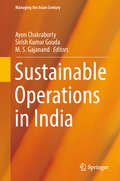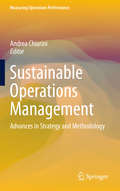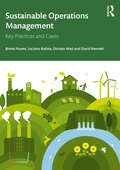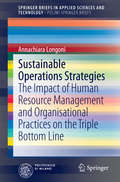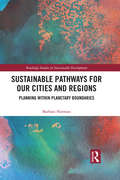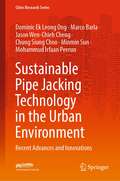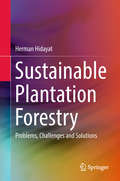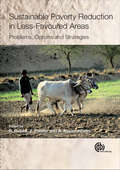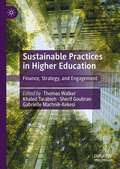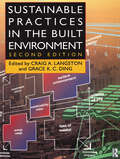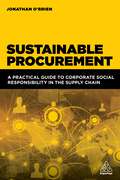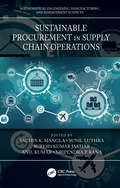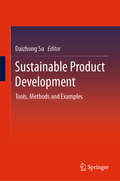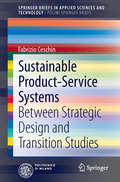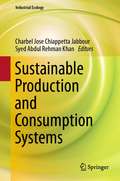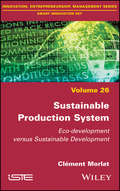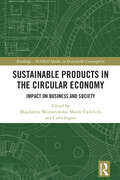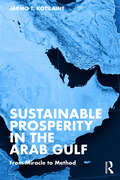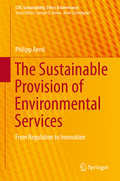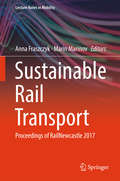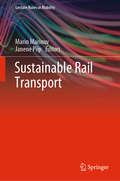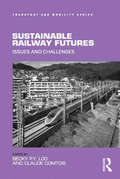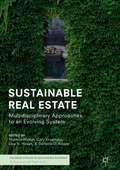- Table View
- List View
Sustainable Operations in India (Managing The Asian Century Ser.)
by Ayon Chakraborty Sirish Kumar Gouda M. S. GajanandThis book focuses on understanding the status quo of sustainable practices in industry operations from an emerging economy perspective, presenting various practices in India. In order to offer a balance between theory and practice, it provides guidelines for applying models to achieve the goal of sustainability in this competitive environment. The chapters include theoretical perspectives, models and empirical evidence on sustainable practices from Indian industries. The book also presents a scholarly perspective on sustainable operations from various researchers and practitioners in India for a global audience in academia and industry.
Sustainable Operations Management
by Andrea ChiariniThis book presents innovative research on various aspects of sustainability in the field of operations management and illustrates the potential of sustainability thinking and practice to improve operations performance and thereby meet customer needs. Particular attention is devoted to corporate social responsibility and marketing strategy, knowledge management for sustainability, the role of culture in a sustainable built environment, sustainable manufacturing through the application of lean and green concepts, advancing sustainability through ISO standards, and the sustainable supply chain. The present decade is proving to be a time of change in terms of business strategies and operations management. Many of the trends are still subject to uncertainty, but an understanding of the need for, and benefits of, sustainability can give a clear indication of their trajectory. Consumers and markets in general believe that while implementing their business strategies, companies should also try to improve society and the environment and to exercise social responsibility toward their employees. This book provides insights into how this may be achieved, and it is recommended for researchers as well as all practitioners and managers dedicated to enhancing sustainability in operations.
Sustainable Operations Management: Key Practices and Cases
by Breno Nunes Luciano Batista Donato Masi David BennettSustainable Operations Management applies the issues of sustainability to all strategic decisions of operations: capacity management, supply network, process technology, and development and organisation. This book extends the existing literature of operations management that for years has been paramount in creating economic value with little consideration of environment and social dimensions. Whilst based on robust theoretical frameworks, some developed by its own authors, the book is enriched by international case studies and real-world illustrations throughout, to demonstrate how this theory translates to practice. Each chapter begins with learning objectives and ends with a summary, activity, and questions for discussion. Readers will gain a comprehensive and in-depth knowledge on how to manage operations for sustainability. They will learn the ways to formulate a sustainable operations strategy and the elements involved in managing tactical and operational activities to enhance sustainability performance over time. The book covers all aspects of the new business sustainability paradigm from an operations perspective, including sustainable development goals, the circular economy and digital transformation. With international agreements and national policies in place around themes such as climate change, ocean plastic pollution, loss of biodiversity, water scarcity, and zero landfill targets, this book will be a must for any university abiding to the Principles of Responsible Management Education (PRIME). The text is suitable mostly for MSc and MBA students on sustainable supply chain and operations management modules as well as broader Operations Management courses, but it can also be used for final-year Undergraduate students as part of advanced operations management modules. Online resources include chapter-by-chapter PowerPoint slides and a test bank of questions.
Sustainable Operations Strategies
by Annachiara LongoniThis book provides detailed guidance on how sustainability, in terms of the triple bottom line, can be developed in operations strategies via human resource management (HRM) and organizational practices such as teamwork, training and employee involvement. The impacts of HRM and organizational practices on environmental and social sustainability, trade-off optimization and the triple bottom line are carefully analyzed, with attention to aspects including organizational responsibility and worker commitment to sustainability. Valuable tips are offered on formulation and implementation of sustainable operations strategies and in addition the alignment of lean manufacturing and the triple bottom line is addressed in a dedicated section. The background to the book and the reason for its topicality, is the difficulty that companies are experiencing in defining and implementing effective sustainability programs that enhance environmental, social and economic sustainability and optimize possible trade-offs. Moreover, although the operations management literature has focused mainly on technical aspects, HRM and organizational practices may also be relevant in enhancing programs' effectiveness and directly impacting sustainability.
Sustainable Pathways for our Cities and Regions: Planning within Planetary Boundaries (Routledge Studies in Sustainable Development)
by Barbara NormanIn an urbanizing world, the majority of people live in urban settlements predominantly on the coastal edge. Focus has historically been on people, place and the challenges and opportunities of living with global change, and academic attention has largely been on sustainability science or sustainable solutions. This book seeks to strengthen the relatively weak link between sustainability science, land use planning and socio-economic change, and show that a more integrated approach to planning will be required to develop more sustainable pathways for cities and regions in the future. Sustainable Pathways for our Cities and Regions builds on the recent publications on cities and climate change, resilient cities and coasts, and sustainable cities, and looks at the ways in which current planning approaches need to be adapted to embrace concepts including green growth, planetary boundaries, healthy cities and longer-term sustainability. Drawing on case studies from four cities selected for their publicly stated commitment to sustainability – Canberra, Kuala Lumpur, Copenhagen and New York – the author proposes seven sustainable pathways and draws conclusions on the positive contribution planning can make in preparing urban and regional communities for significant change in the twenty-first century city. This book will be of great interest to students and scholars of urban planning, sustainable cities, climate change, green growth and community engagement. It will also be of great value to leaders and community activists seeking more sustainable pathways for their cities and regions.
Sustainable Pipe Jacking Technology in the Urban Environment: Recent Advances and Innovations (Cities Research Series)
by Marco Barla Dominic Ek Ong Jason Wen-Chieh Cheng Chung Siung Choo Minmin Sun Mohammud Irfaan PeerunThis book highlights recent advancements and innovations in trenchless technology via the adoption of combined micro-tunnelling and pipe-jacking techniques. This technique is more environmentally friendly, cost effective, less time-consuming and less disruptive compared to conventional open trench excavations for urban construction and urban infrastructure renewal projects. Pipe jacking is a non-destructive technique used in the installation of underground pipelines using a tunnel boring machine (TBM) and thrust forces derived from the hydraulic jack set-up in a deep jacking shaft. It is popular and commonly used worldwide for the installation of sewer and common services cable tunnels as well as for oil and gas pipelines.
Sustainable Plantation Forestry: Problems, Challenges And Solutions
by Herman HidayatThis book discusses sustainable forest management from the perspectives of sociology, anthropology, politics, economics and policy. It examines the roles of governments, private sectors, NGOs, academics and local communities in implementing sustainable plantation forestry, which aims to supply timber for the forestry industry while at the same time reducing global warming. The book also explores the debates on sustainable forest management practices in several countries, and examines the effects of political ecology on plantation forestry as well as the impact of climate change and conservation programs. By analyzing a number of interrelated issues, it offers a valuable resource for all governments, private companies, practitioners, NGOs, academics and students studying forest management and political ecology from a social sciences perspective.
Sustainable Poverty Reduction in Less-favoured Areas
by J. Pender R. Ruben A. KuyvenhavenTypically defined in terms of fragile agricultural resource base and/or limited access, but also occasionally characterized in terms of population dynamics, so-called less-favored areas pose a number of human development and poverty reduction challenges while remaining the home of an estimated 42% of the population of the developing world.
Sustainable Practices in Higher Education: Finance, Strategy, and Engagement
by Thomas Walker Khaled Tarabieh Sherif Goubran Gabrielle Machnik-KekesiThis edited collection presents, reviews, and critically analyzes sustainable practices and long-term-oriented decision-making in Higher Education Institutions (HEIs). Campus closures and the quick transition to hybrid or e-learning as a result of the COVID-19 pandemic caused HEI stakeholders, including students, faculty, and staff, to swiftly adopt new ways of learning, teaching, and administering that were unfathomable only months before. This radical and challenging shift left many in academia with a sense that there is tremendous potential for HEIs to take the lead – both from an educational and practical standpoint – in fostering on- and off-campus sustainability and combatting climate change. In this book, the editors and their contributors systematically highlight current challenges that are slowing or derailing HEIs’ finance-related initiatives and practices geared toward sustainability. The case studies collected in this book provide a holistic overview of the ways in which financial and other long-term decisions can lead to more sustainable practices in higher education.
Sustainable Practices in the Built Environment
by Craig A. Langston Grace K.C. DingSustainability is a key issue and its impact on the construction industry, as one of the major users of the Earth's resources, is starting to take hold. This book deals with sustainability as it affects the construction industry, looking at the techniques and issues which designers, engineers, planners and construction managers will have to deal with in their day-to-day activities. It covers methods of analysis such as environmental impact assessment and cost-benefit analysis as well as topics on design and energy regulation and conservation. The book is an important introduction to the subject for senior undergraduate and postgraduate students. Given the importance and novelty of the subject, professionals in the construction industry will also find the book valuable.
Sustainable Procurement: A Practical Guide to Corporate Social Responsibility in the Supply Chain
by Jonathan O'BrienThe business case for sustainability is clear and organizations are responding to the imperative to act. But with 50-70% of the change needed involving the supply base, procurement and supply chain functions are critical to success.Sustainable Procurement explains how procurement and supply chain professionals can develop existing best practice approaches to make supply side sustainability a reality. Based around the OMEIA® Sustainable Procurement process, this book provides a step-by-step and highly practical methodology that embeds sustainable procurement into existing proven procurement approaches. It also provides crucial new tools that equip and enable those in this field to drive highly effective supply-side sustainability.By exploring the current landscape and the business case for sustainability, Sustainable Procurement makes sense of how we can translate good ambition into prioritised grass roots level change. Guidance is offered on how procurement can help redefine what an organisation does based upon what needs to change in its supply base. There are extensive resources to help determine hot spot risk areas, assess suppliers, and determine and prioritise where to direct our precious resources. It also provides new models for 'sustainable value engineering' to help organisations transform what and how they buy. Written by leading procurement expert and best-selling author, Jonathan O'Brien, this practical guide outlines how to establish sustainable procurement as a key strategic enabler to reduce supply-side risk and drive action to respond to detrimental impacts in the supply base.
Sustainable Procurement in Supply Chain Operations (Mathematical Engineering, Manufacturing, and Management Sciences)
by Sachin K. Mangla, Sunil Luthra, Suresh Kumar Jakhar, Anil Kumar and Nripendra P. RanaSustainable Procurement is an emerging concept in supply chain and operations management. Manufacturing industries have made improvements in moving from cost-based to quality-based, and customer-focused supply chain management strategies. This is becoming an integrated component in the supply chain system, with players becoming aware of the regulations and needs of the customer. It is imperative for production firms to look at the procurement activity as one of the strategic enablers for sustaining the business in the competitive global environment. This book will provide industries with an understanding of the concepts related to sustainable procurement policies and its implementation. Provides decision and theory development models in sustainable procurement supply chains Includes contributions in all three major analytics: descriptive, predictive, and perspectives in the context of sustainable procurement supply chain Discusses new business models with suppliers and opportunities for co-branding Covers how to develop new tools to measure and allocate the gains from sustainable practices among stakeholders Analyses the science of translating data into meaningful and actionable insights
Sustainable Product Development: Tools, Methods and Examples
by Daizhong SuThis book offers a comprehensive review of sustainability and product design, providing useful information on the relevant regulations and standards for industries to meet increasing market demands for eco-products, while reducing their impact on the environment. The examples and methods presented allow readers to gain insights into sustainable products. The authors also explain how to develop products with sustainability features by applying tools and methods for sustainable design and manufacture. These tools/methods include• Regulations/directives related to sustainable product development• Popular lifecycle analysis software packages• Environmental and social lifecycle impact assessment methods• Lifecycle inventory databases• Eco-point and eco-accounting infrastructure• ICT and traceability technologies for sustainable product development• Sustainable design and manufacture• Integrated approach for sustainable product developmentA description of each sustainability tool is accompanied by easy-to-understand guidelines as well as sustainable product development methods. Five different case studies are also presented to illustrate how to apply the tools and methods into the development of real sustainable products.In view of the increasing pressure on industries to meet the, sometimes conflicting, demands of the market and environment, this book is a valuable resource for engineers and managers in manufacturing companies wishing to update their knowledge of sustainable product development. It is also suitable for researchers and consultants who are involved or interested in sustainable product development, as well as for students studying sustainable development, production, and engineering management.
Sustainable Product Management at Solvay
by George Serafeim Mette Fuglsang Hjortshoej Vincent DessainIn November 2019, Ilham Kadri, CEO of Solvay, a Belgian specialty chemicals and advanced materials group, with annual revenues of more than 10 billion in 2018, announced the group's mid-term strategy, eight months after she took the helm as Solvay's 11th CEO. The case describes what options Solvay had to operate a business transformation to follow a growth path while aiming to be a leading environmental solutions company. Solvay had developed a sustainability tool called Sustainability Product Management to identify promising business applications. How effective was the tool? What business lines should Solvay promote to grow and at the same time be more sustainable?
Sustainable Product Platforms: Using Nature's Rules to Design a Platform That Will Maximize Your Returns from Sustainability
by Gregory C. UnruhCan you leverage a simplified materials palette, and renewable energy and value cycle to transform your entire industry? The answer is determined by your ability to exploit nature's platform approach. Just as the biosphere uses DNA to improve upon the accumulated wisdom of evolutionary experiments, you can use a small number of materials and processes to create not just a single sustainable product, but a variety of products in a process of constant, albeit gradual, innovation and change. If you've already built your business around an economically viable value cycle (instead of the traditional value chain), founded on a non-toxic, economical materials palette and energy-efficient process technology, you are on your way to optimizing your value cycle, but your work still isn't done. By leveraging your company's value cycle as a platform for creating new products and attacking fresh markets, your business can amplify the returns from sustainability and build durable competitive advantage. This chapter will provide you with the tools you need to structure and design a value cycle platform, incorporate business partners into new processes, retain platform ownership, and other important strategic considerations. This chapter was originally published as Chapter 4 of "Earth, Inc.: Using Nature's Rules to Build Sustainable Profits."
Sustainable Product-Service Systems
by Fabrizio CeschinThis book investigates the potential contribution that a strategic design approach can make to stimulating and supporting the societal embedding of sustainable PSSs (product-service systems). A new strategic design role thus emerges; a role in which the ideation and development of sustainable PSS concepts is coupled with the designing of appropriate transition paths (sequence of socio-technical experiments) to gradually incubate, introduce and diffuse these concepts. The book also outlines the new design approach and capabilities needed by strategic designers, project managers and consultants to operate at such a strategic level. On a more operational point of view, the work presents a practical "how to do" design process and associated guidelines to support practitioners in designing and managing the societal embedding process of sustainable PSS innovations.
Sustainable Production and Consumption Systems (Industrial Ecology)
by Charbel Jose Chiappetta Jabbour Syed Abdul Rehman KhanThis book opens up a critical dimension to the field of industrial ecology. The book discusses the post COVID-19 trends in the field of industrial ecology and evolving practices adopted by firms for betterment of environment and society. The authors identify valuable lessons to be learned and present conceptual frameworks to guide future industrial ecology applications. Transforming industrial systems into closed-loop industrial ecosystems dramatically reduces the negative impact of industrial activities on the environment. Therefore, this book is important not only for operation management scholars but also those who are interested in ensuring an environmentally sustainable future.
Sustainable Production System: Eco-development versus Sustainable Development
by Clément MorlatWealth is no longer just an ability to live well in a world shaped by human activities. It is also an ability to push back or defer the limits of a world in biological and climatic closure. This book examines the theoretical conflicts and the power plays which often oppose the socio-political and technical-financial practices of recognition of what intervenes in the production of this wealth – i.e. of what has value. It lays down the principles of a contributory modeling method, allowing debates around the concept of development; the building of scenarios; the negotiation of their implementation; and a cross-sectoral reading of their social, ecological and economic costs. This method, called Dynamic Modeling of Cost Systems, is based on a territorial communication device which articulates political, contractual and accounting innovations using deliberative and normative digital tools. It combines different local representations of value, in order to approach wealth through an integrated analysis of micro-, meso- and macro- issues.
Sustainable Products in the Circular Economy: Impact on Business and Society (Routledge-SCORAI Studies in Sustainable Consumption)
by Magdalena Wojnarowska Marek Ćwiklicki Carlo IngraoThis book explores how the circular economy influences product design in today’s business and society. Drawing on contributions from a wide range of expert thinkers, this volume assesses the existing approaches, strategies and tools which facilitate socially and environmentally responsible production and consumption systems. It then goes on to highlight the ways in which the circular economy conceptual framework could be implemented effectively at both micro (product policy) and macro (sustainable consumption) levels in order to alter the industrial landscape and increase its interconnectedness with materials and scarce resources. Highlighting the pros and cons of transitioning to this new model, the book also cautions that it will only be made possible via significant behavior change at both industry and consumer levels. Sustainable Products in the Circular Economy will be of great interest to students and scholars of sustainable manufacturing, sustainable consumption, corporate social responsibility and business ethics. It will also be relevant to industry professionals whose work dovetails with these areas.
Sustainable Prosperity in the Arab Gulf: From Miracle to Method
by Jarmo T. KotilaineTracing the development journey of the Arabian Gulf region with a forward-looking perspective, this book describes how a combination of good fortune, creative experimentation, and determination has enabled the region to achieve prosperity. Today, the Arabian Gulf is well positioned to assume a pivotal role in the new global order. Forced to balance an extreme climate and acute resource constraints, but also an exceptional location, the region’s progress and prosperity have historically been precarious and vulnerable to external shocks. Efforts to transcend resource dependency have typically involved proactive attempts to enable other economic activities. This book argues that, while conventional economic diversification is making headway, the Gulf region is in fact amidst a far more holistic transformation that positions it for a pivotal role in the emerging multipolar global order. It now offers globally competitive regulations and world-class infrastructure at the heart of the Old World, flanked by two fast-growing continents. It has become the hub of choice for a growing share of inter-continental flows of people, trade, and capital, and has established strong economic ties in all directions. This book shows how, despite many risks and challenges, the region possesses the forward-looking vision and necessary resilience that can finally liberate it from its long-standing "resource curse" and a development paradigm that looks likely to provide the foundation for sustained well-being in the decades ahead. The scope and rigor of the book make it suitable as a reference on the Arabian Gulf and for those interested in global affairs and economic development, as well as policymakers and the business community.
The Sustainable Provision of Environmental Services
by Philipp AerniThis book addresses the ability of market-based instruments to improve the sustainable provision of environmental services. The author combines field research and insights from the multi-stakeholder dialogue at the FAO to analyze the gap between the predictions provided by theory and the corresponding outcomes in practice. In particular, the author challenges the theory behind Payments for Environmental Services (PES), a concept derived from neoclassical welfare economics, by demonstrating that PES projects often lack financial sustainability unless local entrepreneurs make use of the resulting new networks to create innovative markets for environmental goods. The author calls for a shift of focus from regulation to innovation in projects and policies designed to improve the provision of environmental services. Its spotlight on the positive social impacts of companies that engage in hybrid PES schemes will make the book appealing to practitioners and policymakers alike.
Sustainable Rail Transport: Proceedings of RailNewcastle 2017 (Lecture Notes in Mobility)
by Anna Fraszczyk Marin MarinovThese conference proceedings include a collection of articles presented at the RailExchange conference in October 2017 at Newcastle University, UK. They will be useful for researchers in developing countries looking for opportunities of knowledge exchange. The RailExchange project aimed to develop sustainable railway education in Thailand, via international partnerships and industry collaborations based around stakeholders' expertise and experiences. It involved staff exchange (academics and researchers) between Mahidol and Newcastle University for joint research and curriculum development and also organizing railway conferences and workshops in both Thailand and the UK.The papers published here focus on rail-related issues and present a perspective of a widely understood 'exchange' in academia and industry environments. 'Exchange' is perceived as rail knowledge exchange between partners, rail staff exchange between academia and/or industry, research exchange between teams, student-lecturer knowledge exchange, academia-industry collaboration, etc. In addition, more general rail-related papers are also included.
Sustainable Rail Transport: Proceedings Of Railnewcastle 2017 (Lecture Notes in Mobility)
by Marin Marinov Janene PiipThis volume presents a collection of rail orientated research articles, covering a variety of topics on rail operations research and management of rail systems as well as innovation, particularly focusing on sustainability aspects. The material consists of the most recent research work of the authors. The authorship is international, which makes it an interesting read for rail academics and professionals around the world. Although the material has a rail research focus the material is also excellent for preparation and delivery of rail, transport and logistics orientated courses and programmes. The target audience primarily comprises research experts in transport research, but the book may also be beneficial for graduate students alike.
Sustainable Railway Futures: Issues and Challenges (Transport And Mobility Ser.)
by Claude Comtois Becky P.Y. LooRevitalizing railways as a major sustainable transport mode in modern societies faces many issues and challenges. This in-depth overview places the importance of railways in the wider context of comprehensive sustainability, which encompasses sustainable development, social and economic equity and community livability. Some scholars have described the 21st century as a period of renaissance for railways and suggest this transport mode can fulfil people's desire for high mobility with low negative environmental, social, economic and financial impacts. In light of these new expectations for railways, in both passenger and freight transport worldwide, this book offers the latest research insights on the renewed interest about railway expansions and their wide-ranging environmental, socio-economic and even political implications.
Sustainable Real Estate: Multidisciplinary Approaches to an Evolving System (Palgrave Studies in Sustainable Business In Association with Future Earth)
by Cary Krosinsky Thomas Walker Stéfanie D. Kibsey Lisa N. HasanThis edited collection broadens the definition of sustainable real estate based on industry trends, research, and the Paris Climate Agreements. Discussions encompass existing and new buildings throughout their life cycle, the financing of their development and operations, and their impact on the surrounding environments and communities. This broader perspective provides a better understanding of the interconnected nature of the environmental, societal, communal, political, and financial issues affecting sustainable real estate, revealing the wide-ranging impact of practitioners' decisions on the sustainable real estate system. Bringing together carefully selected articles from leading global academic and practitioner experts from urban planning, design, construction, and finance, this collection brings to light new opportunities and innovative transdisciplinary solutions to as-yet unresolved problems.
